T: 01822 851370 E: [email protected]
Visit RSN Survey about life in rural England to find out more.
July Edition of Casebook from the Rural Health and Care Alliance
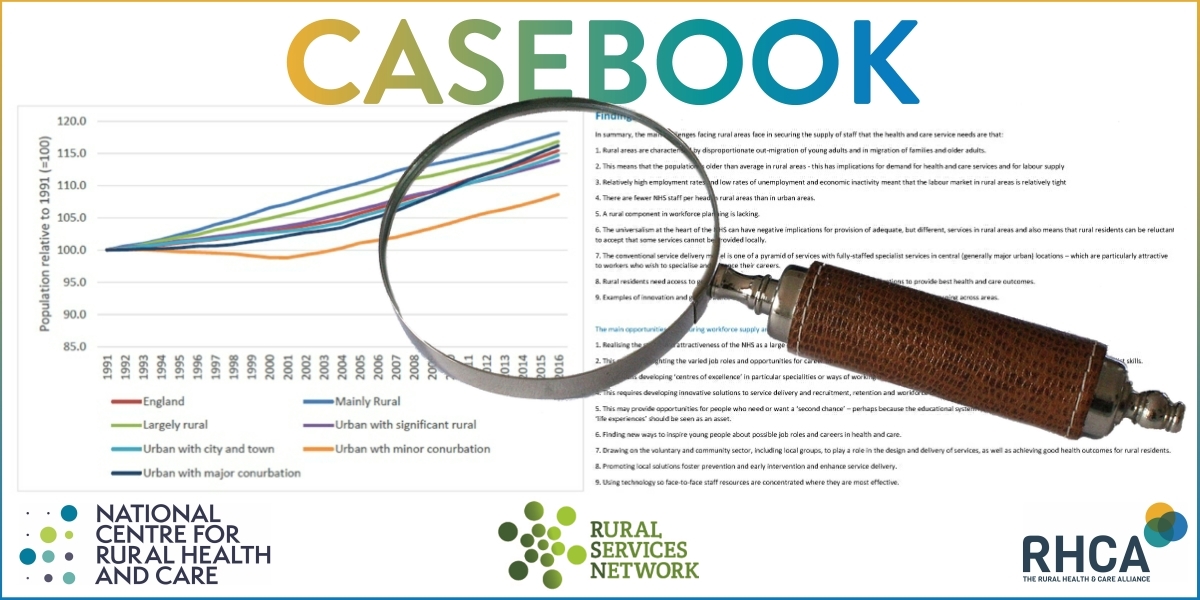
July 2021 Edition
In casebook this month - Health and Care at the moment has all the twist and turns of a James Joyce novel. These twists and turns are even more complicated through a rural lens. The stories in this edition largely suggest themselves. In the National Centre Update section at the end of this edition of Casebook I reflected, whilst writing, that we are very heavily engaged in pushing rural issues on many fronts – which is our job and I don’t mean to sound gratified or complacent but I think we are beginning to make some inroads. Read on!
NEWS COMMENTARY
Covid: PM and chancellor not isolating after Javid test
The race between the virus and the vaccine has not been won. This story serves to show how divisive the growing tensions arising from the race are – in the summer everything is focused on “freedom”, I fear a winter where, particularly for vulnerable rural dwellers, there will be more of an emphasis on the isolated, elderly and vulnerable. This article tells us:
The prime minister and chancellor will not be self-isolating after contact with Health Secretary Sajid Javid, who has tested positive for coronavirus.
Downing Street said the pair would take part in a pilot programme, where daily tests replace self-isolation.
They will have to self-isolate when not working and will only conduct essential business, a spokesman said.
Labour said the public would think this means there is "one rule for them and another for the rest of us".
Mr Javid tested positive on Saturday morning after a meeting at Downing Street the day before, and both Boris Johnson and Rishi Sunak were contacted by NHS Test and Trace as his contacts.
Downing Street is among 20 private and public sector organisations - including Network Rail, Transport for London and Border Force - taking part in a pilot where close contacts of Covid cases take daily tests.
Workplaces need a testing system in place for asymptomatic people and individuals taking part must self-isolate when not working.
Full article: https://www.bbc.co.uk/news/uk-57877373
Dying too young: Maps show little has changed in 170 years
This is fascinating and it shows that whilst there is an ongoing correlation between cities, deprivation and ill health, primary industry areas in rural settings and some specific rural hot spots with other unique characteristics make this whole agenda more nuanced than a simple rural/urban divide. The maps in the article help bring the nuances alive, it begins by telling us:
Healthcare in the UK has vastly improved since Victorian times, yet the geography of coronavirus deaths closely follows the pattern of poor health in the 19th Century.
A succession of studies has found a link between Covid-19 and poverty, with the latest describing a "jaw-dropping" fall in life expectancy in Greater Manchester due to the pandemic.
That pattern of "deeply entrenched" deprivation and ill-health stretches back at least 170 years, according to the chief medical officer for England.
"If you had a map of Covid's biggest effects now and a map of child deaths in 1850, they look remarkably similar," Prof Chris Whitty told an NHS conference in June.
Experts say the problems of crowded housing, insecure work and poor underlying health are echoing down the centuries.
Full article: https://www.bbc.co.uk/news/health-57730353
NHS is failing half of young people with mental health issues
Those with mental health challenges, many of them in rural settings, are set to become one of the categories of the “great overlooked” and this article helps profile how this process already had its roots in some pre-pandemic trends. It tells us.
Up to half of all children and teenagers referred to mental health, learning disability and autism services in the run-up to the pandemic were left without proper support, with parents telling the Observer of children waiting years for treatment and a seven-year-old girl denied support as she was not suicidal.
Data published by NHS Digital shows that in 2019-20 – the most recent figures available – 23% of the 547,590 under-18s referred to NHS mental health, learning disability and autism services had no contact from health workers to deliver care, nor meetings between health workers to support their care. Another 26% – 144,384 people – had their referrals closed without receiving treatment. Some were told they needed social care instead, or passed on to charities, with others simply refused care as local services lacked sufficient capacity.
Full article: https://www.theguardian.com/society/2021/jul/18/nhs-is-failing-half-of-young-people-with-mental-health-issues
Pressure builds on ministers to reach a decision on Covid vaccines for children
This is a really thorny issue. Whilst it is not a straightforward rural/urban challenge I include this article because children in rural settings are a key part of the agenda. I also suspect their specific context and needs will not be addressed by any national decision which is made on the issue. This story tells us:
Pressure is growing on ministers and advisers to reach a decision on vaccinating children against Covid as a Sage scientist warned the current wave risks being the longest yet, with “eye-watering” hospitalisations and deaths possible before the end of the year despite the vaccine rollout.
In June the UK’s Medicines and Healthcare products Regulatory Agency (MHRA) approved the Pfizer/BioNTech vaccine for use on children aged 12-15. In making its decision the MHRA said the jab is safe and effective in this age group and that the benefits outweigh any risks. The jabs are already given to children in some other countries including 5m aged 12 to 15 in the US.
However opinion among experts as to whether the jabs should now be made available to older children in the UK appears to be divided.
While some have suggested there is a delicate balance of risks and benefits to the move, as well as ethical conundrums given vulnerable people in many poorer countries have yet to be jabbed, others stressed it is necessary to prevent disruption to education, reach herd immunity and prevent children becoming ill, including with long Covid.
The Joint Committee on Vaccination and Immunisation (JCVI) has made recommendations to the government on the matter, the Guardian understands. But ministers have yet to reveal what the advice says and what policy decision has been made – a hold-up leaving some committee members baffled.
Full article: https://www.theguardian.com/society/2021/jul/17/pressure-builds-on-ministers-to-reach-a-decision-on-covid-vaccines-for-children
Public Health England accused of misleading cancer patients on Covid jab
This is a really tricky issue and likely to affect many rural dwellers and their families. The sort of treatment associated with blood cancer is challenging to access in rural settings and this worry about low levels of immunity is likely to raise the stress levels of those involved. It tells us:
England’s public health body has been accused of giving hundreds of thousands of cancer patients “misleading and dangerous” advice over the level of protection they can expect after receiving their Covid vaccine.
There were calls yesterday for Chris Whitty, England’s chief medical officer, to intervene and correct a widely reported statement from Public Health England (PHE) stating that a double vaccination was “highly effective in clinical risk groups”.
In a furious letter, seen by the Observer, Blood Cancer UK’s chief executive, Gemma Peters, said she was “deeply disturbed” by the press statement, which covered the findings of a recent study into vaccine responses. She said that its “confident, definitive assertions” about the level of protection given to the UK’s 230,000 blood cancer patients could not yet be supported by the “wider body of evidence on vaccine efficacy in the immunocompromised”.
Full article: https://www.theguardian.com/world/2021/jul/10/public-health-england-accused-of-misleading-cancer-patients-on-covid-jab
MEMBER ARTICLES
We’d love to hear from you - share what you’re proud of
We have a great feature article this month, see below. If you have something, you would like us to feature in a future edition, please let us know by clicking here to send us an email.
Talk, Eat, Drink (TED) East Lindsey - Lincolnshire
 As one of their initiatives to support healthy ageing in Lincolnshire, TED East Lindsey developed its ConnecTED programme to help to alleviate loneliness and isolation in people over 50. This programme involved delivering activity packs with quizzes and recipes, signposting to other services, supporting opportunities for socialising via shared interests, such as their KnitTED Together campaign to share pictures and experiences of knitting projects, and Operation Pen Pal which paired up over 50’s with children and young people to support them to share prose, artwork and messages.
As one of their initiatives to support healthy ageing in Lincolnshire, TED East Lindsey developed its ConnecTED programme to help to alleviate loneliness and isolation in people over 50. This programme involved delivering activity packs with quizzes and recipes, signposting to other services, supporting opportunities for socialising via shared interests, such as their KnitTED Together campaign to share pictures and experiences of knitting projects, and Operation Pen Pal which paired up over 50’s with children and young people to support them to share prose, artwork and messages.
In addition, a telephone befriending service was developed, initially in East Lindsey, but as the Covid- 19 pandemic struck, this was rolled out to residents aged over 50 across the county. This involved befrienders making regular phone calls to older people who wanted to engage with the service. These calls involved social conversations, as well as subtle triaging to assess any immediate or ongoing needs. At the point of roll-out, many initial concerns highlighted involved access to essentials such as food, money and prescriptions, however as engagement continued, befrienders established an understanding of individuals’ needs regarding accessing entertainment and engaging in activities.
The initiative is described though four case studies, and provides recommendations for delivering successful telephone befriending programmes, including emotional engagement, developing empathy and managing expectations.
The full report of the telephone befriending service can be found here.
NATIONAL CENTRE UPDATE
The National Centre continues its dynamic agenda of putting rural challenges and opportunities at the forefront of people’s thinking. Here are some examples of what we are currently up to.
NHS Confederation Community of Practice
The National Centre has been working with the NHS Confederation to set up a community of practice for rural issues open to both sets of organisational members. An inaugural meeting with a focus on covid and localities ran very successfully and involved presentations from: Nuffield Trust, Cornwall Rural Community Charity, Lincolnshire Local Medical Committee, the Confederation and the National Centre. More detailed proposals for the operation of the Community will be circulated to all RHCA members but in the meantime if you have a particular interest in this opportunity to network please let us know. You can access a recording of the inaugural event here:
https://www.nhsconfed.org/events/understanding-impact-covid-19-rural-and-coastal-communities
Parliamentary Inquiry into Rural Health and Care
A successful review meeting of progress towards the writing up of the above Inquiry has recently been held. The follow up actions were agreed with a view to a revised scheduling of a review of the emerging evidence with more third parties once the write up was further developed. This supercedes the original proposal of a follow up meeting in June 2021. The target for launch of the outcomes of the Inquiry remains September/October 2021. If you’d like to hear more about some of the insights arising from the process in the meantime, please feel free to contact us.
Rural Proofing Toolkit
The National Centre now has in principle commitment from Shropshire, Lincolnshire and Devon to trial the new rural proofing for health and care toolkit developed jointly with Rural England and the Nuffield Trust. You can access it via this link:
https://ruralengland.org/rural-proofing-for-health-toolkit/
A follow up discussion to bring the next stage of the process to fruition through a scoping exercise is planned. There is still scope for more organisations to participate. If you are interested please let us know.
Rural IMD
In partnership with Cirican (a consortium of Rural Community Councils) the National Centre ran a successful seminar featuring the rural IMD information developed by University of East Anglia. The key presentations can be accessed on the Cirican website here:
https://cirican.co.uk/2021/06/28/rural-spin-on-the-english-indices-of-deprivation-2019/
Defra Discussions
Through our links with the Rural Coalition we had the opportunity to brief Defra on the key issues in terms of health and care. The points we made are set out below. If you would like to participate in this narrative as it evolves please register an interest by dropping me a line. Key “asks” from Government from a rural perspective:
- A greater focus on the workforce challenges facing health and care from a rural perspective – we feel this is the biggest single issue accounting for rural health inequalities.
- The need for a better and more balanced approach to the use of the IMD. Professor John Shepherd’s (Birkbeck) analysis of the work Mandy Burke and Andy Jones from UEA sits at the heart of this and we are keen to encourage far more extensive use of this nuanced index.
- The need to look more closely at the ongoing unfairness within the funding formula for rural health and care resourcing. The report from the Nuffield Foundation commissioned by the National Centre on this issue is an area of active interest central to the writing up of the outcomes from the APPG Inquiry into Rural Health and Care which is currently in train and will be published in the autumn.
- We also attached a copy of the Rural Proofing for Health Toolkit which we have also launched this year and which as discussed is highly pertinent to this whole agenda.
Coastal Report
It has come to the attention of the NCRHC that Professor Chris Whitty has commissioned a coastal report on health inequalities. This is worth looking out for as the findings will be highly pertinent to our agenda. Professor Sheena Asthana, of the University of Plymouth one of the academics engaged with the report shared her emerging thinking at a recent seminar jointly organised between Cirican (https://cirican.co.uk/) and the National Centre. I am happy to share her slides (with her agreement) if you want to drop me an email.
Campus for Future Living
This really exciting £6.3 million investment in a new multi-agency health centre, combining primary care, meditech development, the creation of community based social care companies and training and CPD activities for clinicians in the isolated rural settlement of Mablethorpe is now accelerating pace. It was developed in part by the National Centre. Key partners including University of Lincoln, Medical Technology Innovation Faculty (Nottingham Trent University), Health Education England, Lincolnshire ICS and East Lindsey District Council. It will be a national, post pandemic centre of excellent for rural health and care, funded by the Towns Fund. If you would like to know more please contact us.
FUNDING OPPORTUNITIES
This month we focus on three funding streams including:
- UnLtd Support for Social Enterprises – healthy ageing and access to employment
- NHS South, Central and West Commissioning Support Unit – psychological therapists, community development, rehab and mental health
- Football Foundation - Premier League Defibrillator Fund– funding for grassroots football clubs
To find out more about each of these funds click here
Spread the word
If you know of other organisations that you think would benefit from joining the Rural Health & Care Alliance, please click here to email us and let us know.
RURAL SERVICES NETWORK
Up to date news on Health and Care
The Rural Services Network provides a useful source of themed news content and data. Check out the latest news on Health & Wellbeing and Vulnerability, where you’ll find articles on a diverse range of rural issues affecting rural communities. You might also find this research on Over 65 Population Projections useful too.
Latest from RSN Member Insights
RSN Member Insights is the place to discover the statistics that define communities within our membership. It is regularly updated with new analyses, and these will be highlighted in the 'What's New' section of the RSN's Weekly Rural Bulletin. The Rural Bulletin also provides a selection of the most rurally topical news items, so do subscribe and encourage your colleagues to subscribe to what is an invaluable weekly periodical.
To make a suggestion of data that would benefit you by being included in the Member Insights section, please email Dan Worth, our Research and Performance Analyst, at [email protected].
| The Rural Health & Care Alliance is a membership organisation administered by the Rural Services Network on behalf of the National Centre for Rural Health & Care. Explore the RHCA service below: |
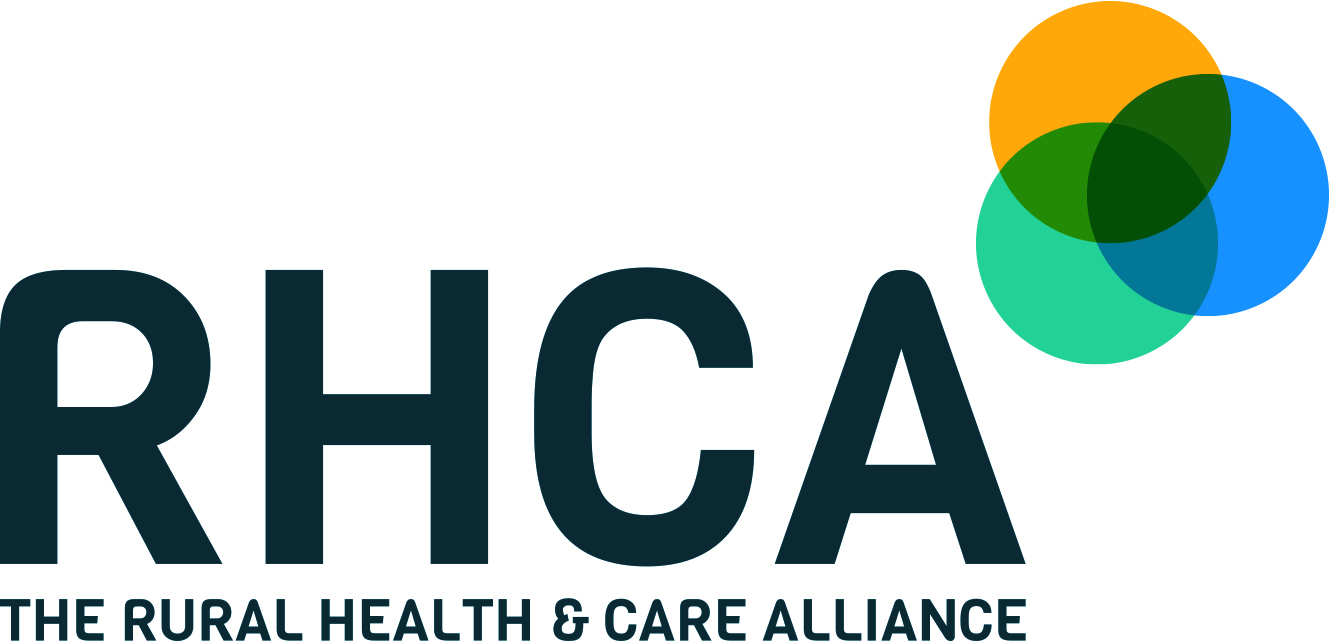 |
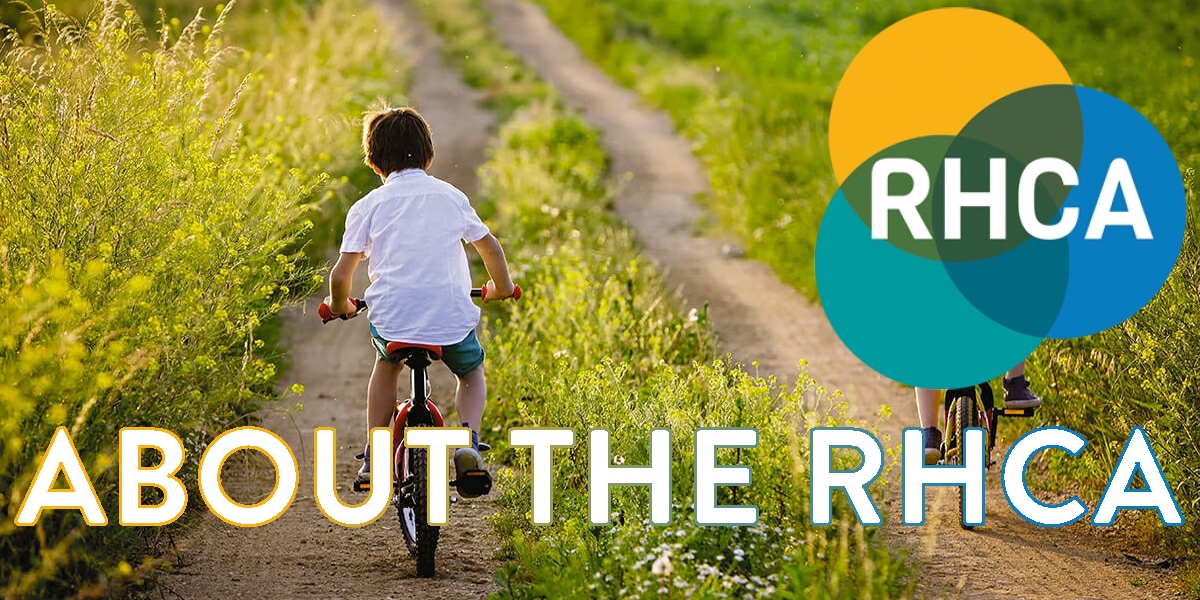 |
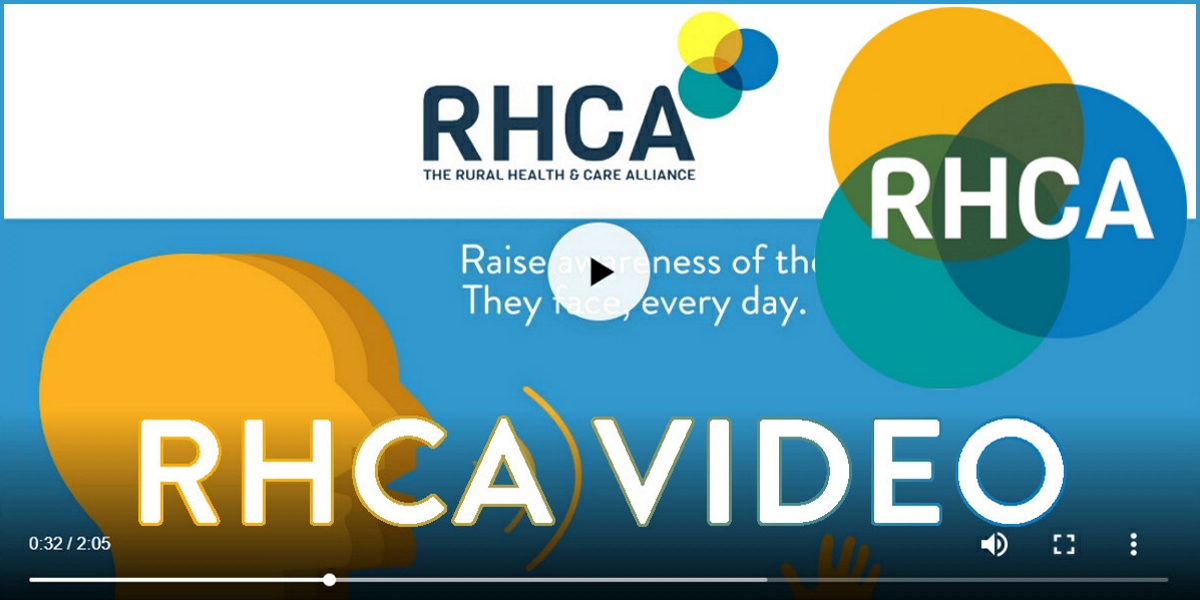 |
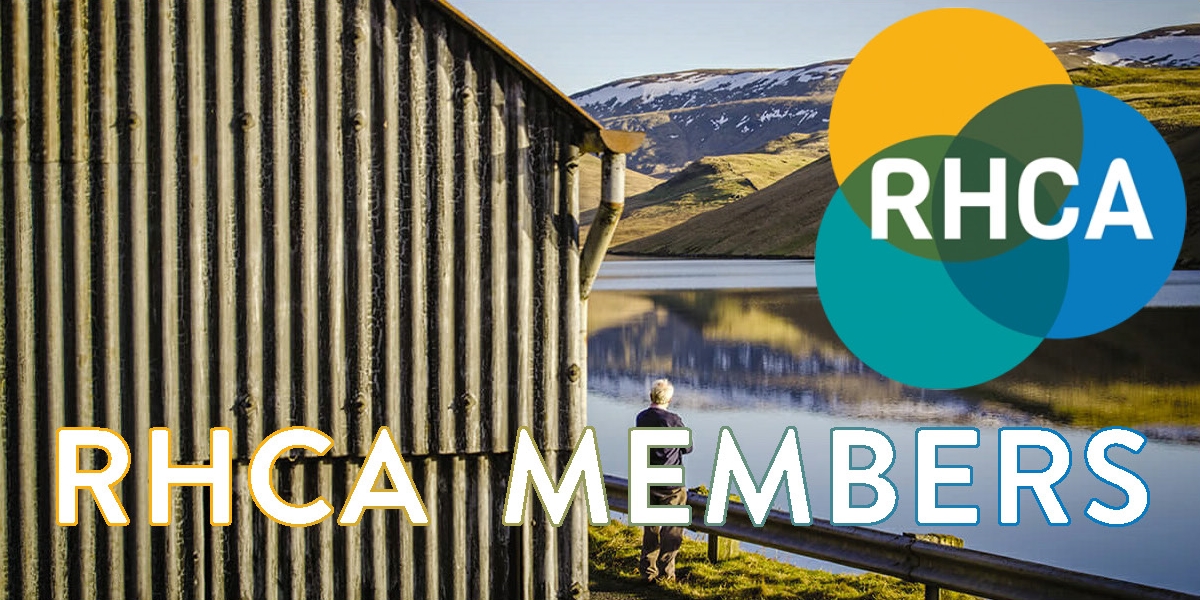 |
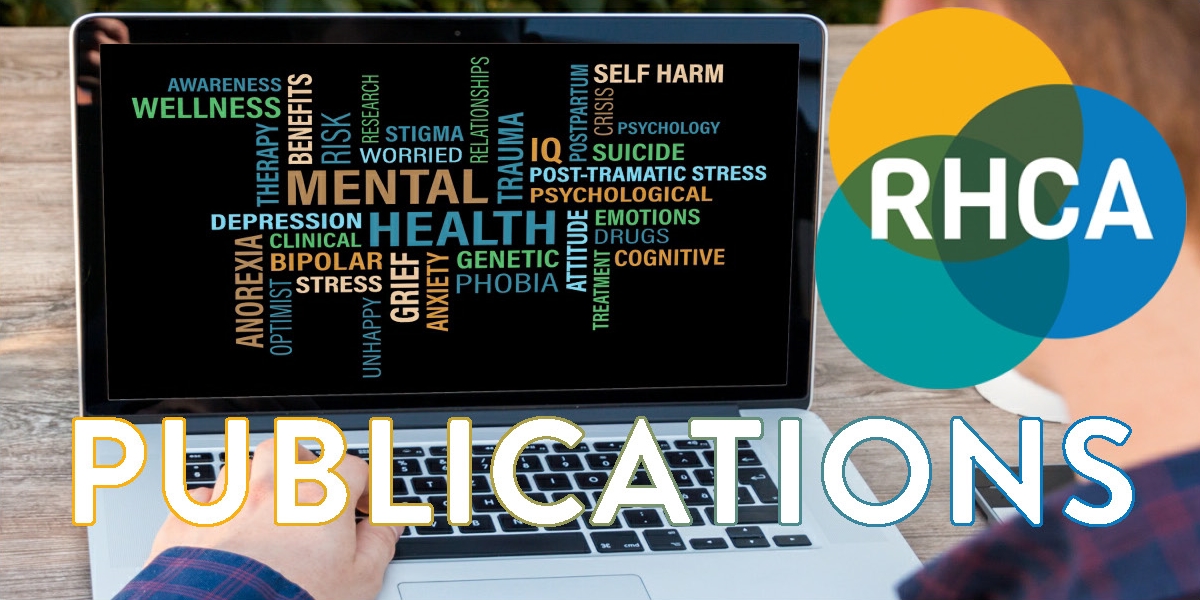 |
 |
 |
 |
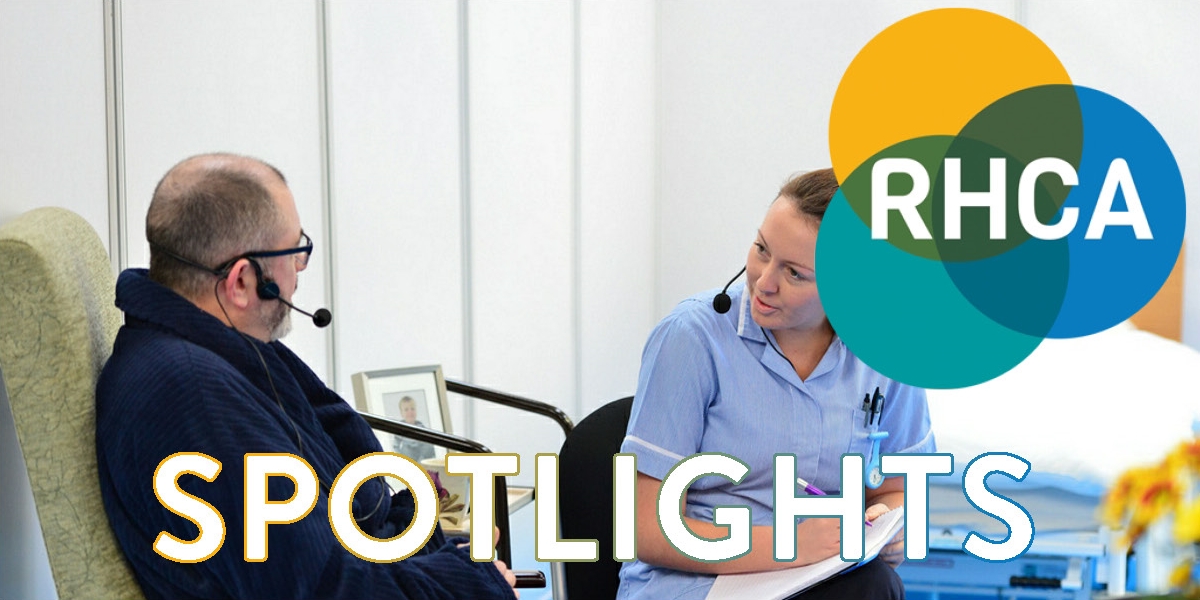 |
 |




